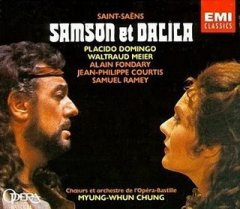Camille Saint-Saens – Samson Et Dalila (1993)
Camille Saint-Saens – Samson Et Dalila (1993)

Disc: 1 1. Dieu! Dieu d'Israel! Ecoute La Priere 2. Un Jour, De Nous Tu Detournas La Face 3. Arretez, O Mes Freres! Et Benissez Le Nom 4. L'as-tu Donc Oublie, Celui Don't La Puissance 5. Qui Donc Eleve Ici La Voix 6. C'est Toi Que Sa Bouche Invective 7. Que Vois-Je? Abimelech! 8. Seigneur! La Troupe Feuriuse 9. Hymne De Joie, Hymne De Delivrance 10. Voici Le Printemps Nous Portant Des Fleurs 11. Je Viens Celebrer La Victoire 12. Danse Des Pretresses De Dagon 13. Printemps Qui Commence Disc: 2 1. Prelude 2. Samson, Recherchant Ma Presence 3. J'ai Gravi La Montagne 4. Qu'importe A Dalila Ton Or? 5. Il Faut, Pour Assouvir Ma Haine 6. Samson, Me Disais-Tu, Dans Ces Lieux 7. En Ces Lieux, Malgre Moi 8. Qu'importe A Mon Coeur Desole 9. Mon Coeur A S'ouvre A Ta Voix 10. Mais!...Non! Que Dis-je? 11. Vois Ma Misere, Helas! Vois Ma Detresse! 12. L'aube Qui Blanchit Deja Les Coteaux 13. Bacchanale 14. Salut! Salut Au Juge D'Israel! 15. Laisse-moi Prendre Ta Main 16. Allons, Samson, Divertis-nous 17. Viens, Dalila, Rendre Grace A Nos Dieux 18. Guidez Mes Pas Vers Le Milieu Du Temple Christian Papis (Baritone) Daniel Galvez-Vallejo (Tenor) François Harismendy (Baritone), Samuel Ramey (Bass) Waltraud Meier (Mezzo Soprano) Alain Fondary (Bass) Jean-Phillipe Courtis (Baritone) Placido Domingo (Tenor) Bastille Opera Orchestra Myung-Whun Chung - conductor
This is an auspicious beginning to what one hopes will be a series of recordings of French opera made with the forces of the Bastille under Chung. Without doubt this is the most subtly and expertly conducted performance of this work to appear on CD, excellent as others have been in this respect, and also the best played and sung. Chung's achievement is to have welded the elements of pagan ruthlessness, erotic stimulation and Wagnerian harmony that comprise Saint-Saens's masterpiece into a convincing whole. His success is based on the essentials of a firm sense of rhythm and timing allied to a realization of the sensuousness and delicacy of the scoring. Whether in the lamenting of the Hebrews, the forceful music written for the High Priest, the heroics of Samson, the sensual outpourings of Dalila, or the empty rejoicing of the Bacchanale, he and his orchestra strike to the heart of the matter—and that orchestra plays with Gallic finesse augmented by a dedicated discipline not always a feature of French playing. They obviously respect and admire their conductor. The choral singing, though too distantly recorded, is no less alert and refined, with a full range of dynamic contrast. Everything is as surely felt as in Sir Colin Davis's account (Philips), but it is dispensed with a surer sense of dramatic development.
The cast couldn't be bettered today, certainly superior to Davis's. Meier's Dalila is French cousin to her Kundry, a fascinating portrayal of this equivocal anti-heroine, seductive, wheedling exerting her female wiles with the twin objects of sexual dominance and political command. All her sense of purpose comes out in her early greeting to the High Priest ''Salut a mon pere'', then she's meditative and expectant as Dalila ponders on her power at ''Se pourrait-il''. The set numbers are all sung with the vocal ease and long phrase of a singer at the zenith of her powers. Something of the voluptuous warmth found in Gorr's singing for Pretre (EMI, 12/63—nla) is all that is missing in a performance sung in virtually faultless French. She makes more of the text than Domingo who sings in his now familiar, all-purpose style, admirable in itself, somewhat missing the particular accents brought to this music by the great French tenors of the past. They exist no more and one must salute the sterling and often eloquent tones of Domingo, now more subtly used than they were for Barenboim back in 1978 (DG). I was occasionally conscious that Domingo sounds in a different acoustic from the other singers.
Fondary is superb as the High Priest, firm and rich in tone, commanding and vengeful in delivery: the most compelling interpreter of the part on disc, tout court. Ramey is luxury casting as the Old Hebrew, but as this is a part once sung by Pinza, Ramey probably felt he wasn't slumming it. After an unsteady start, he sings the small but important role with breadth and dignity. As Abimelech, Courtis makes much of little.
Apart from the two reservations already made the recording is admirable, with a wide an spacious sound, and the soloists forward, but well-integrated into the whole. The Bastille would seem a successful venue for opera recording. This must now be the outright recommendation for this work, one that gave me constant and rewarding pleasure. Noel Goodwin's authoritative note is a further bonus. --- Alan Blyth, Gramophone
download: uploaded yandex 4shared mediafire solidfiles mega zalivalka filecloudio anonfiles oboom ziddu
Last Updated (Monday, 21 April 2014 20:52)








